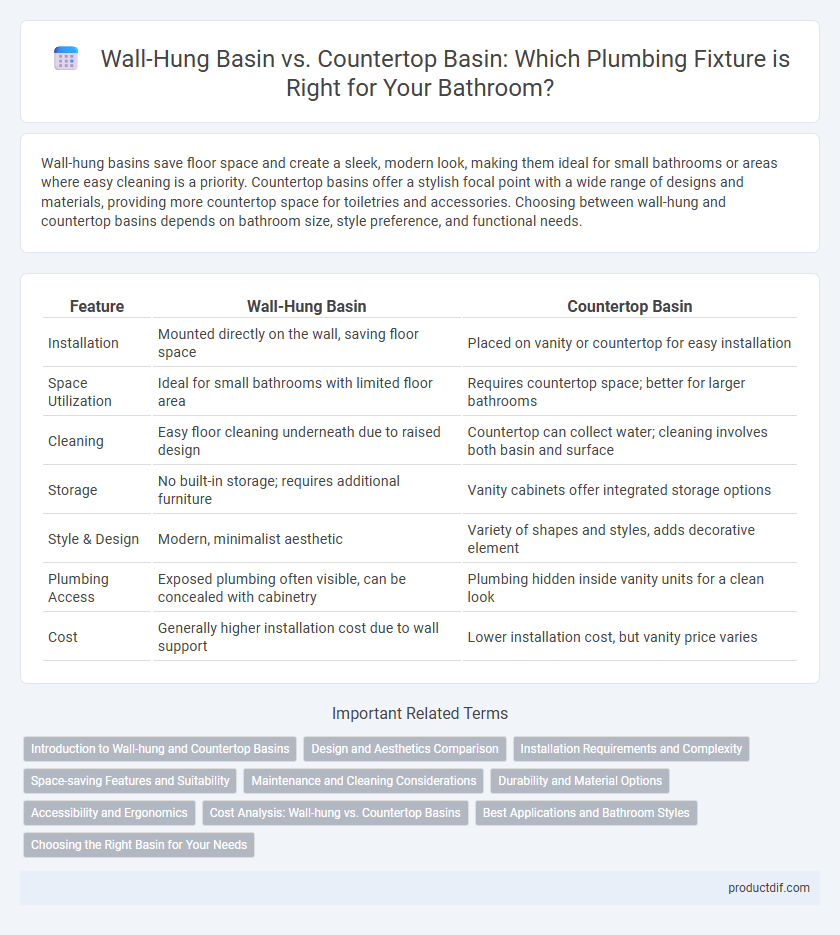Wall-hung basins save floor space and create a sleek, modern look, making them ideal for small bathrooms or areas where easy cleaning is a priority. Countertop basins offer a stylish focal point with a wide range of designs and materials, providing more countertop space for toiletries and accessories. Choosing between wall-hung and countertop basins depends on bathroom size, style preference, and functional needs.
Table of Comparison
| Feature | Wall-Hung Basin | Countertop Basin |
|---|---|---|
| Installation | Mounted directly on the wall, saving floor space | Placed on vanity or countertop for easy installation |
| Space Utilization | Ideal for small bathrooms with limited floor area | Requires countertop space; better for larger bathrooms |
| Cleaning | Easy floor cleaning underneath due to raised design | Countertop can collect water; cleaning involves both basin and surface |
| Storage | No built-in storage; requires additional furniture | Vanity cabinets offer integrated storage options |
| Style & Design | Modern, minimalist aesthetic | Variety of shapes and styles, adds decorative element |
| Plumbing Access | Exposed plumbing often visible, can be concealed with cabinetry | Plumbing hidden inside vanity units for a clean look |
| Cost | Generally higher installation cost due to wall support | Lower installation cost, but vanity price varies |
Introduction to Wall-hung and Countertop Basins
Wall-hung basins are mounted directly on the wall, creating a minimalist look and saving floor space, making them ideal for modern bathrooms with limited area. Countertop basins sit atop vanity units or countertops, offering versatile design options and additional storage underneath, perfect for bathrooms prioritizing aesthetics and functionality. Both types cater to different spatial and stylistic needs, with wall-hung basins emphasizing space efficiency and countertop basins focusing on decorative appeal.
Design and Aesthetics Comparison
Wall-hung basins offer a sleek, minimalist design that maximizes floor space and creates a clean, contemporary look ideal for modern bathrooms. Countertop basins provide a versatile aesthetic with a wide variety of shapes and materials, allowing for creative expression and focal points on vanity surfaces. The choice between wall-hung and countertop basins significantly influences bathroom style, spatial perception, and overall visual impact.
Installation Requirements and Complexity
Wall-hung basins require sturdy wall framing and precise anchoring to support weight, involving more complex plumbing and structural work compared to countertop basins. Countertop basins generally offer simpler installation, needing only a stable vanity surface and standard plumbing connections, making them ideal for quick or less invasive setups. The complexity difference impacts labor costs and time, with wall-hung basins demanding professional expertise for proper alignment and secure mounting.
Space-saving Features and Suitability
Wall-hung basins maximize floor space by mounting directly to the wall, making them ideal for small bathrooms or powder rooms where space efficiency is crucial. Countertop basins, while offering stylish design options and ease of installation, require countertop space, limiting their suitability in compact areas. Space-saving concerns favor wall-hung basins for tight layouts, whereas countertop basins suit bathrooms with ample surface area for storage and decor.
Maintenance and Cleaning Considerations
Wall-hung basins offer easier access for maintenance and cleaning beneath and around the fixture, reducing hard-to-reach areas where grime can accumulate. Countertop basins may require more frequent cleaning around the base and seams to prevent mold and water damage due to their installation on horizontal surfaces. Choosing a wall-hung basin can minimize buildup and streamline routine plumbing inspections, enhancing long-term hygiene and upkeep.
Durability and Material Options
Wall-hung basins often feature robust materials like vitreous china or ceramic, enhancing durability by minimizing contact with floor moisture and facilitating easier cleaning. Countertop basins typically offer diverse material options, including glass, stone, and composite resin, allowing for greater design versatility but sometimes requiring more careful maintenance due to increased exposure. Both types provide durable choices, yet wall-hung basins excel in longevity and ease of upkeep due to their wall-mounted installation and material resilience.
Accessibility and Ergonomics
Wall-hung basins enhance accessibility by offering clear floor space beneath, facilitating wheelchair access and ease of cleaning, while countertop basins often require additional clearance considerations. Ergonomically, wall-hung basins can be installed at customized heights to suit user needs, reducing strain and improving comfort, whereas countertop basins have a fixed height determined by the vanity unit. The choice between these fixtures significantly impacts usability in accessible bathroom designs and ergonomic efficiency.
Cost Analysis: Wall-hung vs. Countertop Basins
Wall-hung basins typically incur higher installation costs due to the need for reinforced wall support and concealed plumbing, whereas countertop basins demand less structural modification and are generally more budget-friendly. The ongoing maintenance expenses for wall-hung basins may also be higher because of complex access to plumbing within the wall. Countertop basins offer a cost-effective solution with easier installation and accessibility, making them a preferred choice for budget-conscious bathroom renovations.
Best Applications and Bathroom Styles
Wall-hung basins are ideal for small bathrooms and modern minimalist styles due to their space-saving design and ease of cleaning underneath, making them perfect for urban apartments and contemporary homes. Countertop basins suit larger bathrooms and eclectic or luxury styles, offering a bold visual statement with various shapes and materials that complement vanity units. Both fixture types enhance functionality and aesthetics, with wall-hung basins favored in streamlined, compact layouts and countertop basins preferred for spacious, decorative settings.
Choosing the Right Basin for Your Needs
Wall-hung basins provide a sleek, space-saving solution ideal for small bathrooms and easy cleaning, while countertop basins offer versatile design options and extra countertop space for storage. Assessing bathroom size, storage needs, and aesthetic preferences helps determine the best choice between these two basin types. Prioritizing functionality alongside style ensures a plumbing fixture that complements your daily routine and room layout effectively.
Wall-hung basin vs Countertop basin Infographic

 productdif.com
productdif.com